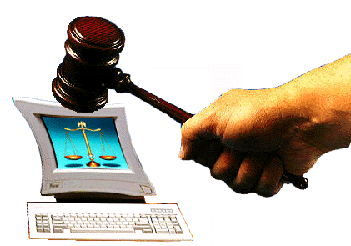

Certain of the cases that have caused so much hoopla this year--notably, Jake Baker--raise no unique cyberspace issues. Instead, the legal issues and results in the Baker case should be identical if Baker had merely distributed his stories as leaflets on streetcorners, or self-published a print magazine.
Because of the newness of the technology, and its corresponding fearfulness to technophobes such as Senator Exon, there is a widespread belief that incidents which occur on the Internet are automatically of a different character, and require different rules, than those that occur offline. Such "insights", based on distinctions without differences, lead to a Neo-Luddite perception that cyberspace itself, rather than being a potentially liberating, pro-democratic technology, is an evil and corrupting influence.
In general, the perception that information published on the Internet is more dangerous than the same information published by conventional means is based on the perception that information on the Net is more widespread, more easily available and will reach more people.
Think about traditional, pre-cyberspace information crimes and torts, however. In general, the amount or number of repetitions of the information, or its ease of access, has nothing to do with guilt and everything to do with punishment. A libel, or a copyright violation, is a legal wrong whether it is done once or repeated a million times. Only years in prison, or dollars of damages, will change based on the number of repetitions.
It is a firm principle of law that if something is legal, you can do it all day long, as many times as you want to, and it does not become illegal as a result. Those, like Senators Exon or Feinstein, who would criminalize information on the Net that is legal offline, have blundered off the correct road: there is nothing special about cyberspace which should make a bomb recipe, which is legal in a library or bookstore, illegal on a bulletin board system. Lets be very wary of double standards, which make bad law. Before you shut down the Net, to prevent children from logging in to penthousemag.com, why not make parents, who have much more control here, responsible for overseeing children's access to online services? There is no moral, and should be no legal difference, between much of the "pornography" available online and that broadcast on Showtime cable on Monday nights during prime time.
As an attorney, I wrote my first software contract in 1981, and was involved with the law of online services by 1984. It rapidly became apparent to us then that most of the unique facts that sprang up around bulletin board systems required no new law to resolve. A libel online was not different than a libel in a newspaper; a copyright violation on a BBS could be resolved by reference to copyright principles created the century before. The truly interesting issues, system operator liability for misdeeds committed by others on the system, themselves could all be resolved by reference to pre-computer precedents. Is the owner of as bar responsible for drug dealing that occurs in the bar, or for solicitations for prostitution written on the bathroom walls? It depends whether he creates a friendly environment for the behavior, or does his best to prevent it when called to his attention. These standards solve any problems pertaining to sysop behavior.
This is not to say new laws are never required, and they may, of course, be convenient and logical even when not required. The introduction of automobiles provides many useful analogies. When the first car thief stole the first car, did he go free because no law pertained? Certainly not--the general criminal laws pertaining to property sufficed. Later laws pertaining to car theft were merely convenient, because we wished to assign different consequences-- sentences or fines--to the acts involved than to the general run of personal property thefts. New laws were not required as a prerequisite to selling cars either; they were personal property, which could be sold like a watch or a rocking chair. On the other hand, speed limits were probably new, called for by the consequences of driving at speeds unheard of before.
It is very hard, so far, to find legal issues which are unique to cyberspace. The ease of downloading software and documents, and the technical difficulty of blocking users from undesirable domains, calls into question both our export and our community standard pornography laws. But, in general, there are no new crimes on the Internet.
If there is one thing members of Congress must be made to understand, it is that new technologies must be studied, and given a chance to flourish, before being regulated. Otherwise, you risk choking something valuable.
